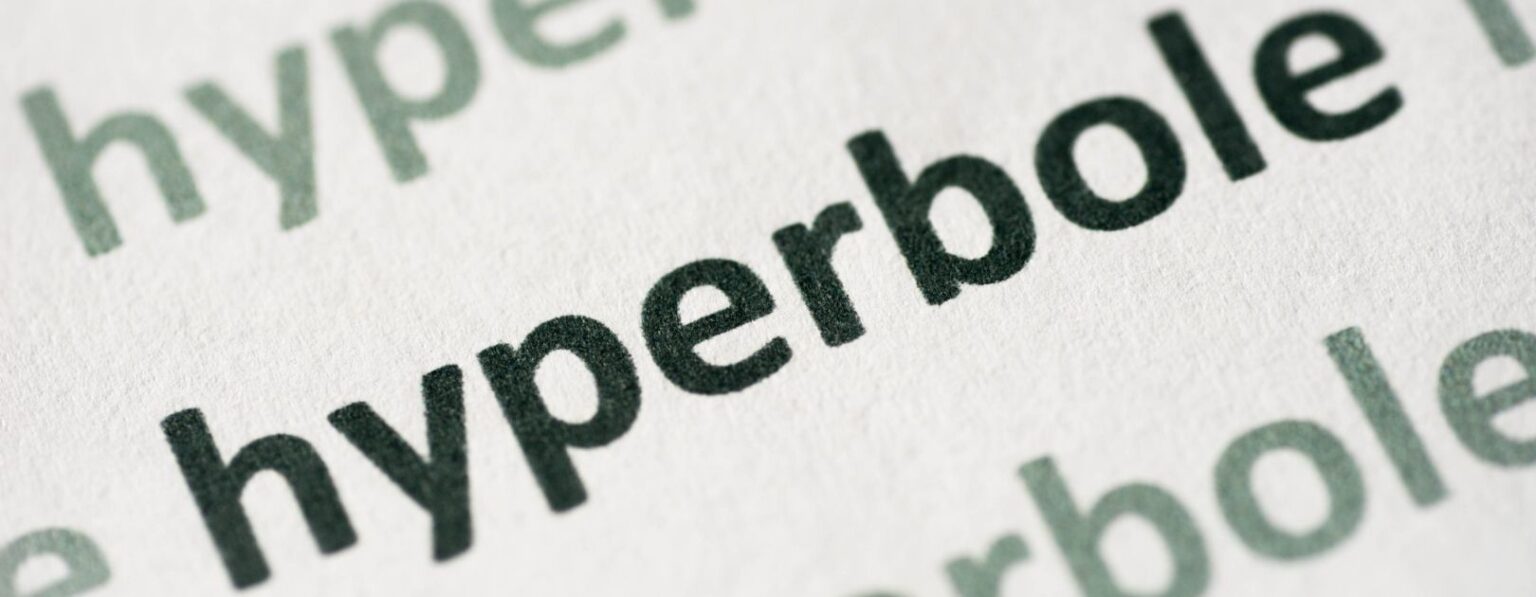“You there my friend are a true king,” and here hyperbole is what we are inferring. Puzzled and looking for hyperbole meaning? Well, an example from daily life will make it easier for you to connect.
Have you ever used “ROFL” in your text message? Surely, you must have used it. ROFL indicates that you laughed a lot after listening to a joke or something. But, if you go by its literal meaning, it says rolling on the floor laughing.
So did you actually roll on the floor? No, right. This is what we call hyperbole.
Interestingly, the word hyperbole is derived from a Greek word meaning “excess”.
Hyperbole means exaggeration used in a sentence to make it more effective. It is a rhetorical and literary device used by an author or speaker for emphasis and effect. For example:
Today, the weather is so hot that I can boil an egg without a burner.
Here, you cannot boil an egg under the sun without a burner, right? Thus, “I can boil an egg without a burner” is an exaggeration used for emphasizing the high temperature during the day.
Is it a comparison? If so, then it might be a simile or metaphor. Does it mean hyperbole is similar to a simile or metaphor? Actually no, hyperbole and simile, both are figures of speech but are different.
For example:
He stood strong like a pillar. (Simile)
Robert met his childhood friend after ages. (Hyperbole)
Simile involves a direct comparison between two, unlike things. But, a simile or metaphor can be used as hyperbole.
For example:
She is as heavy as an elephant. (It’s a simile used as a hyperbole).
The further you read, the more interesting hyperbole will become.
Hyperbole meaning
Though until now, you pretty much have understood the hyperbole explanation. Before learning a well-versed hyperbole definition, it’s important to pronounce the word right.
Here’s how hyperbole pronunciation goes: high-purr-bo-lee.
Now, how does literature define hyperbole?
Hyperbole is defined as a figure of speech in which an author or speaker deliberately exaggerates to an extreme, which is not meant to be taken literally.
Because figurative speeches if taken by the literal meaning, this is how it will sound:
Ryan is so hungry he could eat a horse.
The literal meaning, Ryan wants to eat a horse, but that’s not what the speaker wants to emphasize. Instead, the speaker wants to portray that Ryan is really hungry and that he might eat a lot.
Hyperbole examples with explanation
You will be reading some hyperbole sentences, try to figure out the exaggeration used in these examples.
- My father is older than a hill.
Here, the sentence says that the father is extremely old, a hill is used to emphasize the father’s age.
- This luxurious car must have cost you a bazillion dollars.
Here, the sentence says the luxurious-looking car must be expensive, a bazillion dollar is used to emphasize the car price.
- Ryan complained he had a ton of homework.
Here, the sentence says Ryan has a lot of homework, a ton is used to emphasize the amount of homework.
- Liza said, “It’s been ages since I have had pizza.”
Here, the sentence says Liza didn’t eat pizza for many days, and ages are used to emphasize the duration between now and the last time she had pizza.
Similarly, you will come across many examples and sentences, which you must be using in your daily life without knowing that it’s hyperbole.
Examples in Literature
Hyperbole in literature is used in a poem, novels, and fictional writing to add color to a character or humor to a story. Here’s a glimpse of hyperbole examples from the literature.
Macbeth (By William Shakespeare) From William Shakespeare’s Macbeth, Act II, Scene II:
“Neptune’s ocean wash this blood
Clean from my hand? No. This my hand will rather
The multitudinous seas incarnadine,
Making the green one red.”
This is what it infers, Macbeth feels guilty after killing the king. He regrets his sin, and believes that even the oceans of the greatest magnitude cannot wash the blood of the king off his hands.
As I Walked One Evening (By W. H. Auden)
“I’ll love you, dear, I’ll love you
Till China and Africa meet,
And the river jumps over the mountain
And the salmon sing in the street,
I’ll love you till the ocean
Is folded and hung up to dry.”
The use of hyperbole in the above lines is: – the meeting of China and Africa, the jumping of the river over the mountain, the singing of salmon in the street, and the ocean being folded and hung up to dry. All of these are exaggerations, which is not possible in real life.
The Adventures of Pinocchio (By C. Colloid)
“He cried all night, and dawn found him still there, though his tears had dried and only hard, dry sobs shook his wooden frame. But these were so loud that they could be heard by the faraway hills …”
The crying of Pinocchio all night until his tears became dry is an example of Hyperbole.
Significance
The hyperbole figure of speech is different from other figurative speeches, but you can find plenty of hyperbole in idiom or simile as a hyperbole.
It is used for emphasis and effect. These are implemented in speech and writings to bring particular attention to that thought or idea.
The writers or authors use hyperbole to create an amusing effect or to portray something with intensity. But, hyperboles cannot be used in formal writing, it’s considered inappropriate. Something that demands clarity and precision, shouldn’t have any exaggeration. On the other side of the page, if you are seeking to add some color or effect in your writing from fictional to poetry, hyperbole is what you need.


